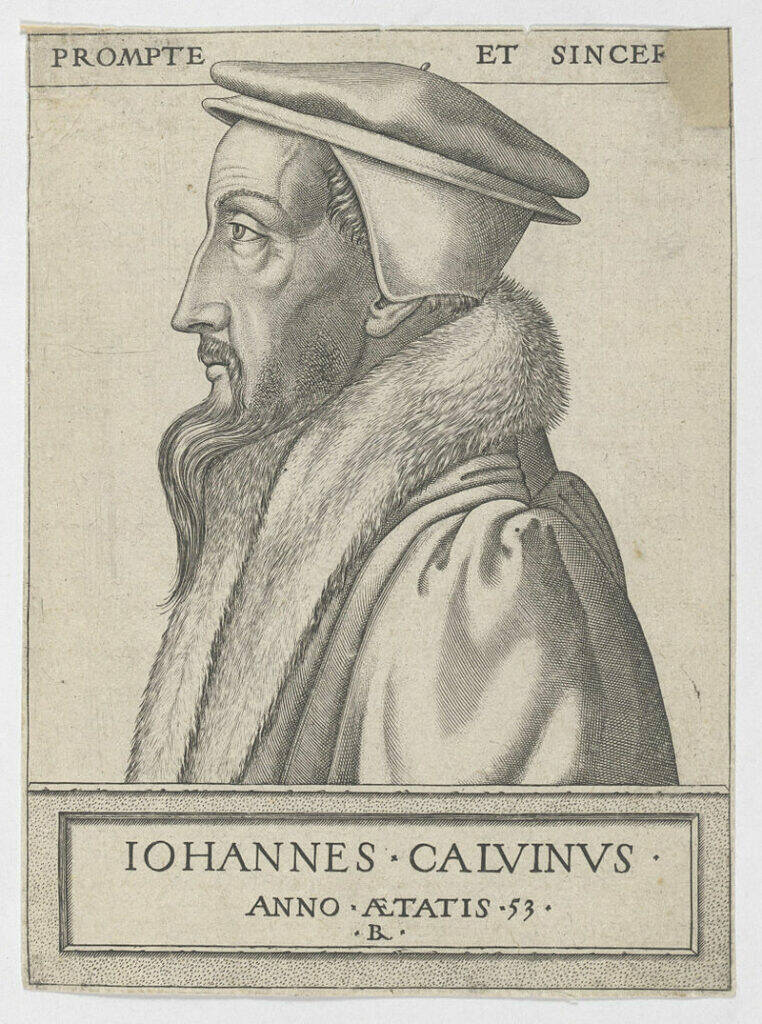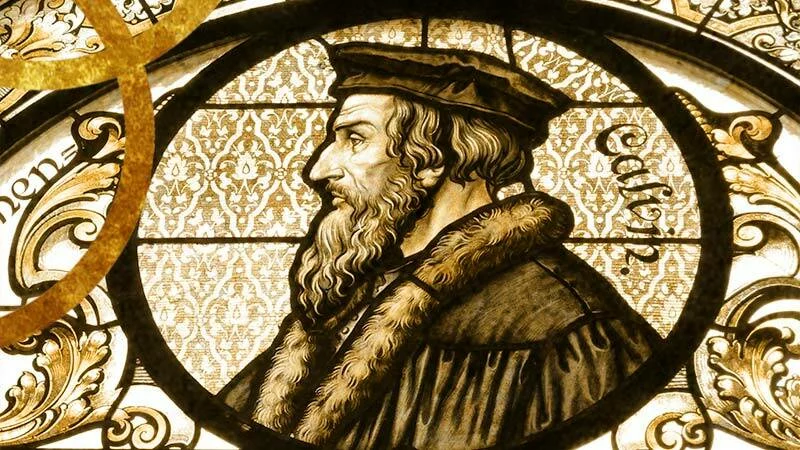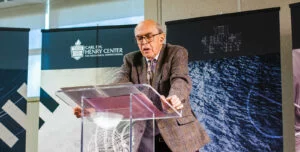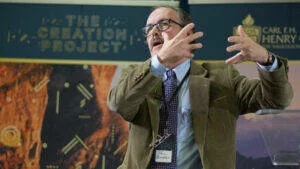On and off between the years 1542-1563, Calvin wrestled with and returned to Genesis;
his commentaries have been known and loved ever since, especially in the English-speaking world. They remain a well-worn resource for preachers and teachers, with Genesis not the least within the Canon. The Calvin Studies Society translations are widely available.
Calvin’s sermons are less well known. Recent translation and publication efforts have resulted in making four selections from Genesis available: Gen. 1:1-11:4; 11:5-20:7; Melchizedek and Abraham, Gen. 14:13-15:7, 21:33-22:14; and Election and Reprobation, Gen. 25:12-27:38. These don’t cover all of Genesis, which is a story for another time.
As we read Genesis with Calvin, he has much to say. We can helpfully consider Calvin’s historical context, his approach to the text, and finally, the usefulness of Genesis.
Historical Context
John Calvin (1509-1564) was a second generation French Reformer, who grew up in the Catholic church and trained as a lawyer in the emerging humanist tradition. Desiderius Erasmus and Jacques Lefèvre de Étaples advocated reform from within the established church. Vitally for Calvin, these scholars provided new editions of and annotations to the biblical text in the original languages and in French. The printing revolution took hold and God’s Word spoke anew in the sixteenth century.

John Calvin at fifty-three years old
The complex relation of these older humanist figures with their popes and rulers highlights the crisis of authority amid which Calvin and his reading of Genesis grew (this is an age of exile, excommunication, and heretics burnt at the stake). The theological faculty in Paris, known as the Sorbonne, represented the church authorities who, according to Calvin, asserted tradition above Scripture. On the other side, the “fanatics” so emphasised the immediate revelation of the Spirit that they sought to judge the Word by their reason. Further, this crisis in religious authority and experience happened at the same time as the Renaissance; and just as Calvin was starting with Genesis, Copernicus’ On the Revolution of the Celestial Spheres was published. Against scientific, philosophical, societal, individual, and religious claims, the authority of God’s Word was not unquestioned.
Amidst these turbulent times, Calvin turned to the Bible for theological insight; but he also knew he was not the first to think biblically and theologically. Calvin read Genesis with the church. Among others, Calvin looked back to Basil, Ambrose, Augustine, and Luther on Genesis, but Calvin’s reading was his own.
Approaching the Text
Calvin sought the literal sense of Scripture which has led some to read him as the forerunner of a historical-critical method. But the literal sense was not discovered for the first-time by Calvin; he inherited it from the tradition, and for him it was a full sense, which incorporated many of the moral and christological considerations of earlier interpreters. So much so that Calvin has been accused of kicking the fourfold sense out the front door only to usher it in the back.
For Calvin, the literal sense is found in the scopus (matter) of Scripture, who is Christ. Christ is the goal of the divine authorial intention expressed in human words.
For Calvin, the literal sense is found in the scopus (matter) of Scripture, who is Christ. Christ is the goal of the divine authorial intention expressed in human words. This cannot be explained merely as Scripture containing human and divine elements, which require a discernible two-fold exegesis. Calvin’s view was not as dualistic as that. Calvin drew on all the tools at his disposal to develop a complex exegesis that remained primarily a doctrinal reading of Scripture for the church. Under the Spirit’s guidance, everything in Calvin’s learning serves Christ as he reads Genesis.
For Calvin there was a basic salvation-historical perspective, centred on Christ, that united all of Scripture. Calvin reads the history of the world in Genesis as the beginning of the covenant fellowship between God and humanity. There is theological (i.e., christological) continuity between the history of the beginning and the later history which unfolds. Calvin rejects a spiritualisation of the first chapter, even that of his beloved Augustine, insisting that Moses lays out the history of visible creation (that’s why we don’t hear about the angels) and God has given a full account of the history of the church from its beginning (the genealogies are included so that the church can calculate how old she is).
This theological reading of history matched well with Calvin’s training. Calvin’s treatment of Genesis as history appears to combine a medieval framework of history, which saw direct providential action in events, with a humanist reading of history, which was shaped purposefully for rhetorical and moral effect. This results in reading Scripture as christological history that gives transparent access to the events. This christological history has a formal unity and a divine Author overseeing the events and the text.
Calvin also approached the text aware of cultural distance between himself and Adam. In one instance Calvin notes differences in how days are measured and in another he observes changes in custom of greetings between the patriarchs and himself. There are debates about Calvin’s knowledge of Hebrew, but he has at least some awareness of Rabbinic readings of Genesis.
Despite cultural distance, Calvin assumed that the text gave transparent access to what happened; he treated the text as a straightforwardly truthful account of what took place.Calvin assumed that the text gave transparent access to what happened; he treated the text as a straightforwardly truthful account of what took place. As well as its divine authorship, Calvin attributed this direct insight to Genesis because he treated it as an eye-witness account. Calvin believed that oral traditions, since Adam, preserved the occurrences until Moses wrote them down. And what Adam had not seen, the Creator had told him.
Despite its character as direct testimony, Calvin still treats Genesis as a crafted and contextualized text. Calvin believes that while Moses was highly educated and aware of the intricacies of the cosmos, he wrote so that all people could understand. This is how Calvin explained some discrepancies between the biblical accounts and the natural philosophy of his day.
At other points, however, Calvin asserted Genesis’ account against a “natural” explanation. We see an early example when he insists that God made light before the sun to demonstrate that he does not require secondary means even though most of the time he uses them. The purpose of Genesis is therefore to bring us to thank and praise God as the source of light and to make us look beyond the sun. The crafting of the text is primarily for theological and spiritual ends, which “natural reason” alone cannot grasp.
Calvin reads Genesis as christological history, and within this framework he uses other tools and training at his disposal. Calvin took full advantage of his education and advances in Hebrew and Greek linguistics, geography, classical studies, medicine, philosophy, and natural philosophy. This is demonstrated when, in his commentary, Calvin includes a map of the rivers surrounding Eden and spends significant time discussing its location based on the descriptions given; this excursus comes despite Calvin’s insistence on brevity in this genre of his work.
Calvin brings the insights of contemporary higher learning to bear on his study of the text. He thinks they can serve Christ and his church by coming to the aid of exegetical, doctrinal, and moral reflection. During his exegesis he uses every tool at his disposal that might serve Christ as the scopus of Scripture and the church’s reverent service of God in all of life.
The Usefulness of Genesis
This final phrase betrays that Calvin read Genesis not simply as an object to be analysed, but as a Word to be heard in faith, applied by the Spirit, and lived out in reverence. Calvin does find significant doctrinal issues addressed in the text, such as creation from nothing and God’s triunity. This is never speculative or for the sake of a system of dogma; these truths are always known by faith and for pastoral ends. Calvin proclaims God as he is toward us and for us in Christ.
At the opening of Genesis, the Creator has priority in Calvin’s thought. The Creator is l’Eternal, who is infinitely distinct and abundantly for creatures in his goodness, wisdom, and power. The agent of creation is triune and the act of creation is “from nothing” as well as in and with time. This is a purposeful beginning. This beginning establishes creaturely goodness and order, for the Creator’s glory. Creation shows the Creator’s fatherly care so that the church might adore Him.
To read Genesis with Calvin is to heed the Word of the Creator and Redeemer to his people, then and now.
Calvin is very aware that Genesis does not stop at chapter 2. The garden was never Adam and Eve’s final destination. The history of the creation of the world is intimately connected with the history of reconciliation that follows. From her beginning, the church knows God as Father and Redeemer in Christ by the Spirit. God has always saved and preserved his people by grace through faith. The mothers and fathers of the church, therefore, offer examples of obedience, pure worship, and perseverance in trial. The whole church is united in Christ and learns together.
To read Genesis with Calvin is to heed the Word of the Creator and Redeemer to his people, then and now. Calvin implores us to come soberly, teachably, gently, and humbly. With this spirit, by faith, we will discern the Spirit’s intention and profit from the usefulness of Scripture.








Comments
Be the first one to make a comment!